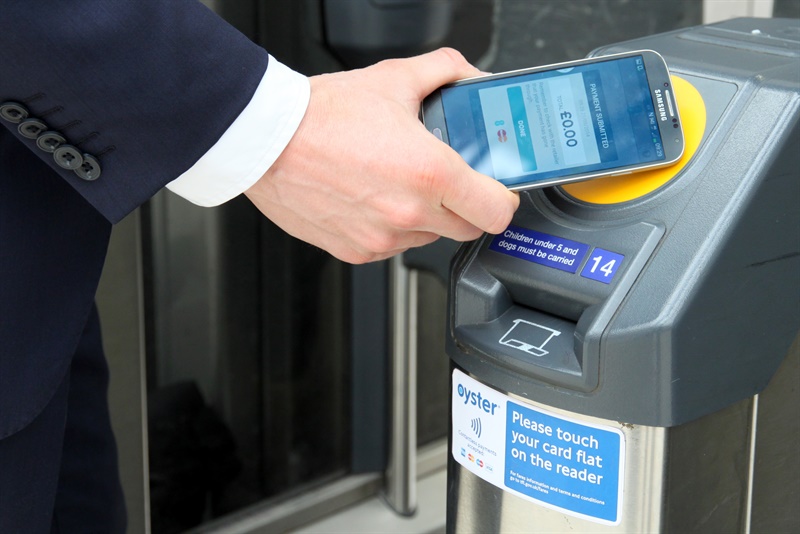16.09.14
Contactless payment goes live across Tube, DLR and Overground
Contactless ‘wave and pay’ payment for passengers travelling on the Tube, tram, DLR, London Overground and National Rail services that accept Oyster has gone live today after years of planning and development.
Transport for London’s (TfL’s) introduction of the wave and pay fares was first introduced on the bus network in 2012, with over one million passengers using a contactless bank card to pay their bus fare around 20 million times.
Journeys paid for with a contactless debit or credit card will be charged at the cheaper Oyster rate, and regular travellers will get daily and weekly caps limiting their fares to the same cost as an equivalent travelcard.
All UK-issued contactless American Express, MasterCard or Visa credit, debit, and pre-paid cards will be accepted for contactless payments. Other methods of contactless payment that meet financial industry standards, including mobile phones, may also be accepted.
TfL and Cubic say it is a “major technological achievement”, which has involved the development of a complex back office by TfL, which interfaces with the ‘front’ and ‘middle office’ services provided by Cubic. Over the past two years, about 20,000 infrastructure assets, like gates and readers, have been retrofitted with contactless-enabled readers.
Since April, 5,000 volunteers have been trialling contactless payment as part of a pilot project.
Roger Crow, senior vice-president and managing director, EMEA for Cubic Transportation Systems, said: “We are delighted to have been able to support TfL in its ambition to deliver the best possible customer experience and choice to London’s residents and visitors. It is a proud day for all those involved in the project and we look forward to working with TfL in the years ahead to ensure London’s transport network maintains its world-class reputation.”
To ensure they benefit from the caps, TfL is reminding passengers that they should always pay with the same card.
Shashi Verma, TfL’s director of customer experience, said: “Accepting contactless payments on transport in London is a fantastic achievement for our city – it provides our customers with the most convenient way to pay for their travel and highlights the capital’s position as a world leader in transport ticketing, technology and customer service.
“Oyster will continue to be available, with contactless payments being another option that lets our customers travel without the need to top up Oyster credit. I would like to remind all of our customers to only touch one card on the reader to avoid paying with a card they did not intend to pay with.”
Mayor of London Boris Johnson added that contactless payment is a great leap forward for the transport network and a world first for a capital “that’s leading the way by using the latest technology to help people get around”.

The next part of TfL’s plans to “revolutionise” ticketing concentrate on how the benefits of contactless can be brought to Oyster, to ensure all customers experience the same convenience.
David Mapp, commercial director for the Association of Train Operating Companies (ATOC), representing train operators, said that making train travel quicker and easier for passengers is “at the heart of what we do”.
Nathan Marsh, smart infrastructure leader at EY, said: “Today heralds the start of the transition from a standard travelcard to widespread use of contactless bank cards, as well as setting the direction for this to progress onto smartphones over the next few years,” he said. “This is a positive development for the sector and good news for customers as it will make transportation systems more accessible and will ultimately lead to a simpler process.”
Marion King, President at MasterCard UK&I said: “MasterCard has long supported TfL, which will now offer travellers the convenience of paying for their journeys with contactless technology. Today’s milestone means travel on buses, tubes, tram, trains and the DLR can all be paid for with contactless cards or devices.
“The MasterCard Global Destination Cities Index shows us that London is the world’s number one destination and is projected to receive nearly 19 million visitors in 2014. All of these visitors using the TfL network will benefit from the ease, speed and security which contactless payments bring with it. Paying for journeys by contactless enabled phones is also a reality, with MasterCard’s ‘Cash on Tap’ partnership with EE, and we will continue to innovate to ensure electronic payments are convenient and safe across London’s transit network.”
However, Caroline Pidgeon, the leader of the Liberal Democrats on the London Assembly, said the new payment was welcome so long as Oyster card users were not penalised.
“The Mayor has already broken a longstanding pledge that Oyster will always provide the cheapest fare option,” she said. “We are now in the situation where we have a weekly cap on fares for people using contactless payment but this is denied to people who rely on Oyster PAYG. This is unfair and penalising some of the poorest Londoners who have no bank account facilities or simply do not have enough money to pay upfront for a weekly or monthly pass.”
In addition, Labour's transport spokesman Val Shawcross stated that TfL has continually promised that Oyster will always carry the cheapest fares, and that introducing a new way to pay shouldn't change that.
She added: “It is particularly important given that 440,000 people in London do not have bank accounts and a vast number more will not have access to contactless payment cards.”
This morning there have been a few people commenting on the contactless payment introduction on Twitter:
Tell us what you think – have your say below or email [email protected]